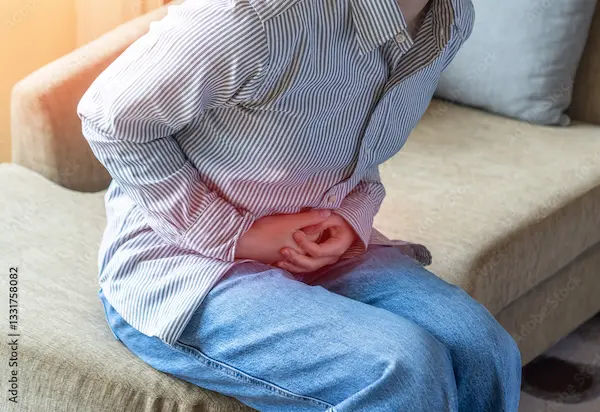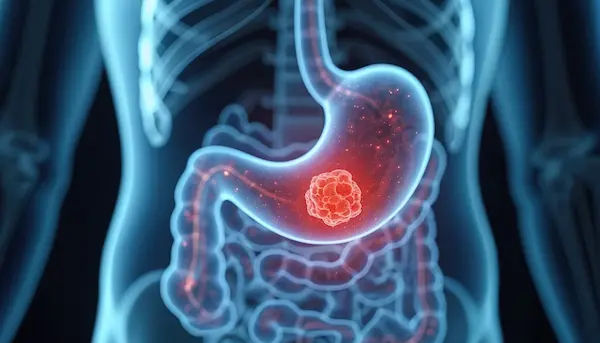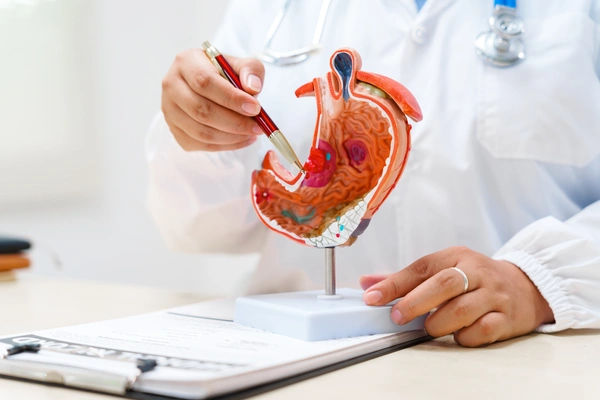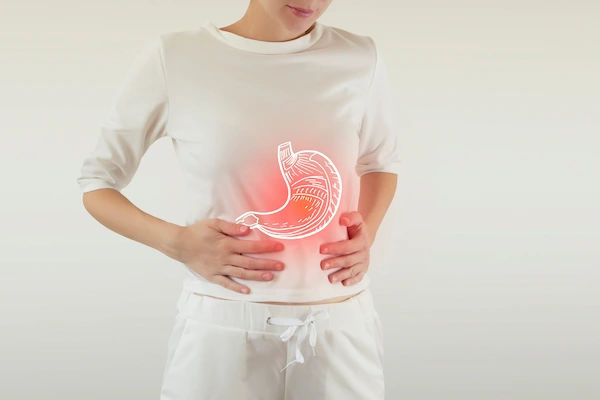Stomach Cancer Signs: Early Symptoms You Shouldn't Ignore
Learn the early warning signs of stomach cancer—including persistent indigestion, feeling full quickly, nausea, and unexplained weight loss. Understand symptoms, risk factors, diagnosis, and when to seek medical care for timely treatment.

Written by Dr. M L Ezhilarasan
Reviewed by Dr. Rohinipriyanka Pondugula MBBS
Last updated on 13th Jan, 2026

Stomach cancer, also known as gastric cancer, often begins subtly. In its earliest stages, it may cause few or no symptoms, making it easy to dismiss warning signs as common indigestion or a minor stomach bug. However, recognising the early indicators can be crucial for timely diagnosis and effective treatment. This silent progression is why understanding the potential signs is so vital. This article will serve as a detailed guide, walking you through the common and less common symptoms of stomach cancer, explaining why they occur, and clarifying when it's essential to consult a healthcare professional. We'll move beyond a simple list and delve into what these feelings might mean, empowering you with knowledge about your stomach cancer health.
Understanding Stomach Cancer: A Brief Overview
Before diving into the symptoms, it's helpful to understand what stomach cancer is. It occurs when normally healthy cells within the stomach lining become abnormal and grow out of control, forming a tumour. This process usually happens slowly over many years. Precancerous changes often occur first in the inner lining (mucosa) before developing into cancer. Because these early changes rarely cause symptoms, they frequently go undetected. Risk factors include a diet high in smoked, pickled, or salty foods; smoking; a family history of gastric cancers; and infection with the bacteria H. pylori. Understanding this background underscores why paying attention to persistent changes is so important.
The Most Common Early Signs and Symptoms
The initial symptoms of stomach cancer are notoriously vague and non-specific, meaning they overlap with many far more common and less serious conditions, such as gastritis or peptic ulcers. However, their persistence is the key differentiator.
Persistent Indigestion and Heartburn (Dyspepsia)
- Almost everyone experiences indigestion occasionally. However, persistent or painful indigestion that is a new feeling for you, especially if it doesn't respond well to over-the-counter antacids, warrants medical attention. This feeling might be described as burning discomfort, gnawing pain, or a sense of fullness soon after you start eating.
Feeling Full Quickly When Eating (Early Satiety)
- This is one of the more characteristic early signs. You may feel unusually full after eating only a small amount of food—perhaps just a few bites. This occurs because a tumour can affect the stomach's ability to expand and hold food normally or can obstruct the passage of food, creating a false sense of fullness.
Nausea and Vomiting
- Mild nausea is a common symptom of many ailments. With stomach cancer, however, nausea can be persistent. In some cases, vomiting may occur, and if a tumour is causing an obstruction, you might even vomit blood or have vomit that looks like coffee grounds, which is a medical emergency.
Progressive Symptoms as Cancer Develops
As the cancer grows and potentially spreads, the symptoms often become more pronounced and severe. These signs indicate that the condition is advancing and requires immediate medical evaluation.
Unexplained Weight Loss and Loss of Appetite
- Significant, unintentional weight loss is a red flag for many types of cancer, including stomach cancer. This happens because the body's metabolism changes, and the cancer consumes energy. Coupled with early satiety and sometimes difficulty swallowing, it leads to a reduced caloric intake, causing dramatic weight loss.
Abdominal Pain and Discomfort
- While early discomfort might be vague, the pain can become more consistent and localised as the tumour grows. You might feel pain or a burning sensation in the upper abdomen. The pain may also shift and be felt in the bone if the cancer has metastasised, indicating advanced gastric cancer symptoms.
Blood in Stool or Vomit
- This is a critical symptom that should never be ignored. A bleeding tumour can cause blood to appear in vomit (bright red or looking like coffee grounds) or in the stool. Blood in the stool may make it appear black and tarry (melena). This signifies active bleeding within the digestive tract.
Less Common but Important Signs to Recognise
Some symptoms are not directly related to the stomach but can be caused by the effects of cancer on the body as a whole or by the spread of the disease.
Fatigue and Weakness from Anaemia
- Chronic, subtle bleeding from a tumour can lead to iron-deficiency anaemia. This occurs when your body doesn't have enough healthy red blood cells to carry adequate oxygen to your tissues. The primary symptom of anaemia is profound fatigue and weakness, along with pale skin and shortness of breath.
Jaundice (Yellowing of Skin and Eyes)
- If the cancer spreads to the liver, it can cause jaundice. This results in a yellowing of the skin and the whites of the eyes, often accompanied by dark urine and itchy skin. Jaundice indicates that the liver is not functioning properly.
Difficulty Swallowing (Dysphagia)
- A tumour located near the oesophagus (the tube that connects your throat to your stomach) can make swallowing difficult. You might feel like food is getting stuck in your throat or chest, or you may experience pain when swallowing. This is a significant symptom that needs prompt investigation.
When to See a Doctor: A Practical Guide
It cannot be stressed enough: many of these symptoms are caused by conditions other than cancer. However, you should always err on the side of caution. Schedule an appointment with your doctor if you experience:
- Any of the common symptoms that are persistent and do not improve after a few weeks.
- Symptoms that are severe or worsening over time.
- Unexplained weight loss accompanied by stomach pain or fatigue.
- Difficulty swallowing that is new and persistent.
- Any signs of bleeding, such as blood in your vomit or black, tarry stools.
When answering, your doctor will likely ask about the duration, frequency, and severity of your symptoms. Be prepared to provide a detailed history.
Diagnosis: What to Expect if Cancer is Suspected
If your doctor suspects stomach cancer, they will not jump to conclusions. The diagnostic process is methodical.
1. Physical Exam and History: They will feel your abdomen for any swelling, fluid, or tenderness and check for signs of anaemia.
2. Upper Endoscopy (EGD): This is the primary diagnostic tool. A thin, flexible tube with a tiny camera (endoscope) is passed down your throat to examine the lining of your oesophagus, stomach, and the first part of your small intestine. If any abnormal areas are seen, a biopsy can be taken during this procedure.
3. Imaging Tests: If cancer is confirmed, CT scans, PET scans, or endoscopic ultrasound may be used to determine the stage of the cancer—how deep it has grown and if it has spread—which guides treatment decisions.
Conclusion
Recognising the signs of stomach cancer is the first critical step toward a diagnosis. While the initial symptoms can be subtle and easily mistaken for common digestive issues, their persistence is what should prompt action. Listening to your body and advocating for your health is paramount. Do not dismiss ongoing discomfort, unexplained weight loss, or any signs of bleeding. Schedule a conversation with your healthcare provider to discuss your concerns. Remember, in most cases, these symptoms will have a benign cause, but obtaining a clear diagnosis is the only way to achieve peace of mind and, if necessary, begin the most effective treatment as early as possible. Your vigilance could make all the difference.
Consult an Oncologist for Personalised Advice
Consult an Oncologist for Personalised Advice

Dr. Amit Choraria
Surgical Oncologist
18 Years • MBBS, MS (Surgery) Fellow, Surgical Oncology, Tata Medical Center (FSO) Fellow, European Board of Surgery (Surgical Oncology) (FEBS) Fellow, Minimal Access Surgery (FMAS) Fellow, Indian Association of Gastrointestinal Endosurgeons (FIAGES) UICC Fellow, Royal Marsden NHS, London, UK Visiting Scholar, Plastic Reconstructive Surgery, CGMH, Taiwan Fellow, Robotic Surgical Oncology, Vattikuti Foundation, USA
Kolkata
Apollo Multispeciality Hospitals , Kolkata, Kolkata
(75+ Patients)

Dr. Sanchayan Mandal
Medical Oncologist
17 Years • MBBS, DrNB( MEDICAL ONCOLOGY), DNB (RADIOTHERAPY),ECMO. PDCR. ASCO
Kolkata
MCR SUPER SPECIALITY POLY CLINIC & PATHOLOGY, Kolkata

Dr. Harsh J Shah
Surgical Oncologist
15 Years • MS, MCh (GI), DrNB (GI)
Ahmedabad
Apollo Hospitals Gandhinagar, Ahmedabad

Dr. Vishal Choksi
Head and Neck Surgical Oncologist
20 Years • American Head & Neck Society (AHNS) certified from Memorial Sloan-Kettering Cancer Centre, American Board of Surgery (ABS) certified general surgeon, MBBS (India)
Ahmedabad
Apollo Hospitals Gandhinagar, Ahmedabad

Dr. Gopal Kumar
Head, Neck and Thyroid Cancer Surgeon
15 Years • MBBS, MS , FARHNS ( Seoul, South Korea ), FGOLF ( MSKCC, New York )
Delhi
Apollo Hospitals Indraprastha, Delhi
(25+ Patients)
More articles from Stomach Cancer
Frequently Asked Questions
What does early stomach cancer pain feel like?
Early pain is often vague and can be mistaken for indigestion or an ulcer. It's typically a dull, persistent ache or a burning sensation in the upper abdomen that doesn't seem to resolve with typical remedies.
Can blood tests detect stomach cancer?
There is no single blood test that can diagnose stomach cancer. However, doctors use blood tests to check for anaemia (which could be caused by bleeding) and to look for certain biomarkers like the HER2 protein or for elevated levels of substances such as CA 19-9, which can provide clues and help monitor treatment.
How long can you have stomach cancer without knowing?
It's possible to have precancerous changes or early-stage stomach cancer for years without any noticeable symptoms. This silent progression is why the cancer is often advanced by the time it is diagnosed, highlighting the importance of paying attention to subtle, persistent changes.
Is burping a lot a sign of stomach cancer?
While excessive burping can be associated with stomach cancer due to indigestion and a buildup of gas, it is an extremely common symptom of many benign conditions, such as acid reflux, diet, or aerophagia (swallowing air). It is rarely a sign of cancer on its own but should be evaluated if it's a new, persistent problem accompanied by other symptoms like pain or weight loss.
What are the first stages of stomach cancer?
The earliest stage, Stage 0, involves abnormal cells only in the inner lining of the stomach (carcinoma in situ). Stage I means the cancer has formed and grown into deeper layers of the stomach wall but hasn't spread. These stages typically cause few to no symptoms.




